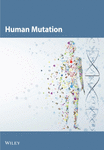Identification of variants in NFKBIA and association analysis with hepatocellular carcinoma risk among chronic HBV patients†‡
Communicated by Mark H. Paalman
Online Citation: Human Mutation, Mutation in Brief #617 (2003) Online http://www.interscience.wiley.com/humanmutation/pdf/mutation/617.pdf
Abstract
Human nuclear factor of kappa light chain gene enhancer in B cells inhibitor, alpha (NFKBIA) inhibits the action of NF-κB by forming a heterodimer with NF-κB, and preventing its translocation to the nucleus. We have sequenced a human NFKBIA full gene including −1000bp promoter region to identify its gene polymorphisms as a potential candidate gene for host genetic study of Hepatocellular Carcinoma (HCC). Nine novel single nucleotide polymorphisms (SNPs) and one GAA deletion were identified; two in promoter region (c.−673A>T, c.−642C>T), two in exon 1 (c.78G>A (Leu26Leu), c.81C>T (Asp27Asp)), three in introns (c.284T>A, c.1952A>G and c.2444C>T) and three in 3'UTR (c.2710-2712delGAA, c.2758G>A and c.3053G>A). Among ten identified variants, six were selected for larger scale genotyping (n=1,750) for association study based on frequencies and location. Haplotypes, their frequencies and linkage disequilibrium coefficients (∣D′∣) between SNP pairs were estimated. Allele frequencies of each SNPs and haplotypes were compared between patients with HCC and patients without HCC among HbsAg positives by logistic regression. As a conclusion, we could not find any significant association of NFKBIA variants with development of HCC among chronic hepatitis B patients. © 2003 Wiley-Liss, Inc.




